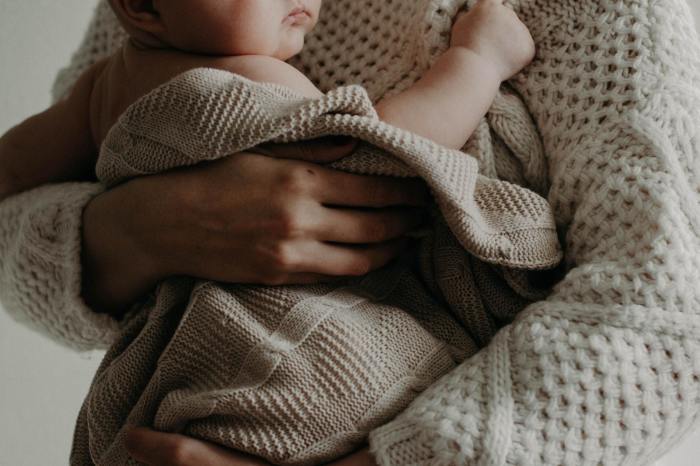Suicide of pastor’s wife illuminates silent, deadly ‘public health crisis’ among mothers

Seven days after Paige Hilken’s death, North Coast Church Senior Pastor Chris Brown said the grief her family experienced was so deep not even a Bible verse could help.
“I promise you, there is not a right sentence, there is not a right prayer, there is no verse in the Old Testament or in the New Testament that’s going to help on a day like today,” he said in his opening statement at her memorial service on Aug. 7. “We are going to go through a really bad morning together. And that’s the honesty of days like today.”
On July 31, Paige Hilken, the 28-year-old wife of 32-year-old North Coast Church Teaching Pastor Christopher Hilken, took her life at an Arizona mental health facility four months after giving birth to her fifth child.
The approximately 1-hour service to remember the life she lived featured no pictures or videos of her. It was “just too much to sit through” for her family. They were grieving with questions that perhaps won’t be answered, explained Brown.
“This family, for the last seven days, has just grieved and held on to each other in the midst of questions that won’t be answered. And that’s also true on a day like today. Almost every question you have won’t be answered. And we won’t be able to do that in a service or probably in this lifetime,” he said.

For months, Brown revealed, Christopher Hilken had wrestled with how to address his wife’s deteriorating mental health. Days before she took her life, he made a decision that was supposed to help but left him a widower with five young children.
“Over a week-and-a-half ago, when Chris did the absolute best job he could after months of just struggling with this ordeal and just finding and researching the absolute best clinic in the country and getting Paige there, and then to receive a phone call that doing the absolute best you can, the mind was just broken,” Brown revealed without sharing much else about Paige Hilken’s suicide.
In his emotional recollection of the beauty and strength of his late wife, Christopher Hilken remembered her as “an amazing Jesus follower, wife and mother.”
“Even in the darkest depths of her sickness, she never relented to remind us of [that] all the time and time again," he recalled. "Her last words she ever texted to me before surrendering her phone at the mental health facility where she passed reminded us of this too. ‘Hey baby, I’m giving up my phone now. You’ve been the best husband and father I could have ever asked for and I love you.'"
Paige Hilken was not a weak person, her younger sister, Renee Finley, remembered in a tribute on Aug. 7. She was a beloved, passionate, overachiever who everyone in the small town where she grew up in California looked up to.
“We grew up on a farm in northern California. She was an all-star softball player. Everyone in the town looked up to her. It was Paige Finley. She graduated high school at 16 and started playing college softball that semester," Finley recalled. "Can you imagine sending your daughter off to school at 16? But she did it. Not only that, she graduated college at 19. And then to put the cherry on top, she decided to get married a few weeks later.”
And then Paige Hilken would go on to have five kids who were all under the age of 6 at the time of her death. She homeschooled them and “started multiple businesses and influenced thousands of women through her online ministries,” Finley said. “Whatever she set her mind to she could accomplish.”
All the circumstances surrounding the death of the late pastor’s wife remain unclear and her family and church did not immediately respond to requests for interviews from The Christian Post.
There is some evidence online, however, that suggests that Paige Hilken had been struggling with motherhood and the duties of domestic life as her mental health spiraled.
“[What] I’ve come to realize over the last few years is that I often find myself being idle in the things that DO matter by making myself busy in the things that don’t matter at all. I’m constantly distracting myself with what I feel matters now for what matters MOST,” she wrote on Instagram last October during her fifth pregnancy.
“Here’s an example....I’ll find myself diving deep into the depths about a health related topic on someone’s Instagram for hours, while ignoring an area of my house that desperately needs to be cleaned up or even worse, while ignoring my children and their needs. Learning about things I’m passionate about isn’t a bad thing but when it replaces the most important things I have been called to do, it is unwise,” she confessed.
“And you know what’s interesting? Whenever I neglect my household and the things I’ve clearly been called to do I end up feeling much more discontent and overwhelmed overall, though the idleness and indulgence in these ‘other things’ feels good and right in the moment. I’ve come to realize that when I lean into Gods design for me and prioritize my life according to his will the reward is great and I’m overcome with peace."
A few months later in January, Paige Hilken detailed on her blog how she contracted COVID-19 while still pregnant and how it affected her mentally.
“For a week or two after my initial symptoms of a cold went away I struggled with some pretty intense brain fog, which I would describe as being all there mentally but almost feeling like I was in a dream," she wrote. "Sometimes the brain fog would be accompanied by some feelings of dizziness as well. This symptom has mostly cleared but sometimes during the hours of 5-8pm I’ll get these brain fog feelings."
Then on April 8, shortly after she gave birth, she wrote about her “post partum reality” on Instagram, revealing how she developed a pulmonary embolism and was fervently praying about her condition with her church community.
“I’ve been processing so much mentally the last few days and clinging tightly to God. We have been so incredibly grateful for our community of prayer warriors who have been praying and continue to pray for the road ahead,” she said. “We are praying this clot completely dissolves as quickly as possible, that the medications do their job with zero side effects and that I will be able to have complete trust in God with my current circumstances and my future.”
Months later, Paige Hilken took her life.
A public health crisis

While Paige Hilken’s suicide has been a stunning singularity for her family and friends, research shows maternal suicides are a growing public health crisis desperately in need of attention.
A recent study published in JAMA Psychiatry cites suicide as a leading cause of maternal death following childbirth in the United States and suggests that the prevalence of suicidal ideation and intentional self-harm in pregnant and postpartum women appears to be on the rise.
In Trends in Suicidality 1 Year Before and After Birth Among Commercially Insured Childbearing Individuals in the United States, 2006-2017, lead author Dr. Lindsay Admon recommends with her colleagues ensuring access to universal suicidality screening and appropriate treatment for pregnant and postpartum individuals “to mitigate this growing public health crisis, particularly for high-risk groups."
Admon is an obstetrician-gynecologist at Michigan Medicine Von Voigtlander Women’s Hospital and a researcher with the University of Michigan Institute for Healthcare Policy and Innovation.
In their study, Admon and her team of researchers analyzed data on 595,237 childbearing women 15 to 44 years of age who were enrolled in a commercial health insurance plan in the U.S. between 2006 and 2017.
Some 2,683 individuals were diagnosed with suicidality one year before or after giving birth for a total of 2,714 diagnoses. The prevalence of suicidal ideation increased from 0.1% in 2006 to 0.5% in 2017, while the prevalence of intentional self-harm increased from 0.1% in 2006 to 0.2% in 2017.
Reports of suicidality in women with diagnoses of depression or anxiety also increased from 1.2% in 2006 to 2.6% in 2017. Meanwhile, reports of suicidality in women with diagnoses of bipolar or psychotic disorders increased from 6.9% in 2006 to 16.9% in 2017. The study further showed larger increases in suicidality over the study period in non-Hispanic black individuals, those with lower income and younger individuals.
“Suicide deaths are a leading cause of maternal mortality in the U.S. It is a public health crisis that has silently grown worse,” Admon told reporters. “We need to improve screening for mental health wellness during and after pregnancy. We know that untreated mental health conditions put both moms and their children at higher risk for adverse health outcomes, including preterm birth and maternal suicide.”
Since 1990, according to data cited by Columbia University Irving Medical Center, maternal mortality in the United States, which is the highest among wealthier nations, has more than doubled to an estimated 18 per 100,000 births.
Columbia researchers estimate this rate could likely be higher if deaths from suicide and accidental overdoses are counted. Some studies estimate maternal deaths due to suicide or drug use account for between 14% and 30% of maternal mortality depending on the location.
Dr. Kimberly Mangla, a reproductive psychiatrist at Columbia University Vagelos College of Physicians and Surgeons, said there are no good estimates of exactly how many maternal deaths are taking place across the U.S. because there is no national registry or database of suicide and overdose deaths that records pregnancy status.
“It wasn’t until 2003 that CDC first recommended that states add a pregnancy status checkbox to death certificates, but inclusion of the checkbox is voluntary, so we don’t have data from all states,” Mangla said, according to a report from Columbia University Irving Medical Center.
“We desperately need better, more reliable data. This would require accurate reporting of pregnancy status on death certificates and consideration of autopsy findings or other diagnostic tests to determine cause of death in this population.”
Christopher Garrett, a senior media adviser with the U.S. Department of Health and Human Services, acknowledged that maternal suicides aren’t tracked by SAMHSA separately. He was asked by The Christian Post if there was any recent data on maternal suicides from the Substance Abuse and Mental Health Services Administration that would speak to the latest findings from independent researchers on the scope of the problem.
“While SAMHSA does not track maternal suicide data as a separate track, we have programs geared toward helping women who might be dealing with postpartum and maternal depression get connected to support," Garrett said in a statement.
He noted, however, that they do provide some help for mothers in distress and a 24/7 Maternal Mental Health Hotline is being developed.
"Additionally, the Health Resources and Services Administration (HRSA) is working to establish a Maternal Mental Health Hotline to be staffed 24 hours a day by qualified counselors. SAMHSA also wants to stress that anyone with suicidal thoughts or concern for a loved one who might be suicidal should contact the national Suicide Prevention Lifeline at 800-273-8255.”





























